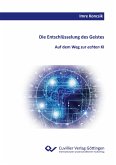Brain Networks in Neuroscience: Personalization Unveiled Via Artificial Intelligence
Herausgeber: Bairagi, Anupam Kumar; Aung, Si Thu; Islam, Sheikh Mohammed Shariful; Hassan, Md. Mehedi; Yasmin, Farhana
Brain Networks in Neuroscience: Personalization Unveiled Via Artificial Intelligence
Herausgeber: Bairagi, Anupam Kumar; Aung, Si Thu; Islam, Sheikh Mohammed Shariful; Hassan, Md. Mehedi; Yasmin, Farhana
- Gebundenes Buch
- Merkliste
- Auf die Merkliste
- Bewerten Bewerten
- Teilen
- Produkt teilen
- Produkterinnerung
- Produkterinnerung
This book is an in-depth exploration of brain networks, providing a comprehensive understanding of their structures, functions, and implications for personalization through artificial intelligence. It offers the seamless integration of neuroscience principles with artificial intelligence applications.
Andere Kunden interessierten sich auch für
![Die Entschlüsselung des Geistes. Die Entschlüsselung des Geistes.]() Imre KoncsikDie Entschlüsselung des Geistes.35,88 €
Imre KoncsikDie Entschlüsselung des Geistes.35,88 €![The Antichrist and the Artificial Intelligence The Antichrist and the Artificial Intelligence]() Juan Vitaliano Quiñónez AlbánThe Antichrist and the Artificial Intelligence56,99 €
Juan Vitaliano Quiñónez AlbánThe Antichrist and the Artificial Intelligence56,99 €![Artificial Intelligence and the Apocalyptic Imagination Artificial Intelligence and the Apocalyptic Imagination]() Michael J. Jr. PaulusArtificial Intelligence and the Apocalyptic Imagination30,99 €
Michael J. Jr. PaulusArtificial Intelligence and the Apocalyptic Imagination30,99 €![Family Abuse and the Bible Family Abuse and the Bible]() Aimee K Cassiday-ShawFamily Abuse and the Bible61,99 €
Aimee K Cassiday-ShawFamily Abuse and the Bible61,99 €![Artificial Intelligence and the Apocalyptic Imagination Artificial Intelligence and the Apocalyptic Imagination]() Michael J. Jr. PaulusArtificial Intelligence and the Apocalyptic Imagination19,99 €
Michael J. Jr. PaulusArtificial Intelligence and the Apocalyptic Imagination19,99 €![The Cambridge Companion to Religion and Artificial Intelligence The Cambridge Companion to Religion and Artificial Intelligence]() The Cambridge Companion to Religion and Artificial Intelligence85,99 €
The Cambridge Companion to Religion and Artificial Intelligence85,99 €![The Antichrist and the Artificial Intelligence The Antichrist and the Artificial Intelligence]() Juan Vitaliano Quiñónez AlbánThe Antichrist and the Artificial Intelligence33,99 €
Juan Vitaliano Quiñónez AlbánThe Antichrist and the Artificial Intelligence33,99 €-
-
-
This book is an in-depth exploration of brain networks, providing a comprehensive understanding of their structures, functions, and implications for personalization through artificial intelligence. It offers the seamless integration of neuroscience principles with artificial intelligence applications.
Produktdetails
- Produktdetails
- Verlag: River Publishers
- Seitenzahl: 342
- Erscheinungstermin: 3. Juli 2025
- Englisch
- Abmessung: 234mm x 156mm
- Gewicht: 860g
- ISBN-13: 9788770047364
- ISBN-10: 8770047367
- Artikelnr.: 73874094
- Herstellerkennzeichnung
- Libri GmbH
- Europaallee 1
- 36244 Bad Hersfeld
- gpsr@libri.de
- Verlag: River Publishers
- Seitenzahl: 342
- Erscheinungstermin: 3. Juli 2025
- Englisch
- Abmessung: 234mm x 156mm
- Gewicht: 860g
- ISBN-13: 9788770047364
- ISBN-10: 8770047367
- Artikelnr.: 73874094
- Herstellerkennzeichnung
- Libri GmbH
- Europaallee 1
- 36244 Bad Hersfeld
- gpsr@libri.de
Md. Mehedi Hassan (Member, IEEE) is a dedicated and accomplished researcher and completed a Master of Science (M.Sc.) degree in computer science and engineering at Khulna University, Khulna, Bangladesh. He is a member of the prestigious Institute of Electrical and Electronics Engineers (IEEE). Mehedi completed his B.Sc. degree in computer science and engineering from North Western University, Khulna in 2022, where he excelled in his studies and demonstrated a strong aptitude for research. As the founder and CEO of The Virtual BD IT Firm and VRD Research Laboratory, Bangladesh, Mehedi has established himself as a highly respected leader in the fields of biomedical engineering, data science, and expert systems. Mehedi's research interests are broad and include important human diseases, such as oncology, cancer, and hepatitis, as well as human behavior analysis and mental health. He is highly skilled in association rule mining, predictive analysis, machine learning, and data analysis, with a particular focus on the biomedical sciences. As a young researcher, Mehedi has published 52 articles and 2 books in various international top journals and conferences, which is a remarkable achievement. His work has been well-received by the research community and has significantly contributed to the advancement of knowledge in his field. Overall, Mehedi is a highly motivated and skilled researcher with a strong commitment to improving human health and well-being through cutting-edge scientific research. His accomplishments to date are impressive, and his potential for future contributions to his field is very promising. Additionally, he serves as a reviewer for 49 prestigious journals. Md. Mehedi Hassan has filed more than 3 patents out of which 2 have been granted to his name. Farhana Yasmin, currently pursuing her Ph.D. at the School of Computer and Software, Nanjing University of Information Science and Technology, Nanjing, China (210044), earned her B.Sc. degree from the Department of Computer Science and Engineering, Eastern University, Bangladesh. She furthered her academic journey by completing her M.Sc. degree in computer application and technology at Changzhou University, China. She has expertise spanning computer vision, biomedical engineering, and data science all under the expansive domain of artificial intelligence (AI). Farhana's research focuses primarily on predictive analysis and the advancement of expert systems. Her scholarly contributions include approximately 9 publications in esteemed international journals such as IEEE, Elsevier, and Springer. Collaborating with researchers globally, she actively seeks to broaden her knowledge and enhance her proficiency in her field. Dr. Shariful Islam is a physician scientist at the Institute for Physical Activity and Nutrition, Deakin University. He is Honorary Senior Lecturer at Sydney Medical School, University of Sydney and Honorary Senior Fellow at the George Institute for Global Health, UNSW. Previously he led the diabetes research program at the Center for Control of Chronic Diseases, ICDDR,B and has experience working with United Nations Development Programme, World Health Organization, German Technical Cooperation and as a resident cardiologist in Bangladesh. He has more than 99,000 citations to his scholar profile. Anupam Kumar Bairagi (Senior Member, IEEE) received B.Sc. and M.Sc. degrees in computer science and engineering from Khulna University (KU), Bangladesh, and a Ph.D. degree in computer engineering from Kyung Hee University, South Korea. He is a Professor of Computer Science and Engineering Discipline, KU. He has authored or coauthored around 60 publications, including refereed IEEE/ACM journals and conference papers. His research interests include wireless resource management in 5G and beyond, healthcare, the IIoT, cooperative communication, and game theory. He has served as a technical program committee member for different international conferences. Dr. Si Thu Aung received a B.Eng. degree from Technological University, Myanmar in 2014, a Master of Engineering in Electronics from Mandalay Technological University, Myanmar in 2017, and a Ph.D. in Biomedical Engineering from Faculty of Engineering, Mahidol University, Thailand, in 2021. He is currently a post-doctoral researcher at Rail and Modern Transports Research Center under National Science and Technology Development Agency, Thailand Science Park, Pathum Thani, Thailand. His current research interests include biomedical signal processing, digital image processing, machine learning, and deep learning.
1. Exploring Brain Connectivity: Structural, Functional, and Effective
Networks in Neuroscience 2. Advances in Brain Imaging Technologies: A
Comprehensive Overview 3. Understanding Brain Connectivity: From Synapses
to Networks 4. Artificial Intelligence in Neuroscience 5. Brain Networks in
Neuroscience: Tailoring Treatments with AI Insights 6. Brain Network
Dynamics: Implications for Health and Disease 7. Neural Dynamics:
Unraveling the Complexity of Brain Activity 8. Decoding Brain Signals:
Perspectives from AI-powered Examination 9. Neuroimaging Techniques:
Innovations and Applications 10. Intelligent Movement-Controlled
Brain-Computer Interface System Based on EEG Signal 11. Decoding Brain
Signals for Connectivity Analysis with Machine Learning: Innovations and
Applications in Neuroscience 12. Interpreting Electroencephalogram Brain
Signals: Insights from AI-driven Analysis 13. Neuroinformatics in the Era
of Personalized Neuroscience 14. Deciphering Minds and Motion: A Unified
Exploration of Brain Signal Decoding and Activity Recognition through
AI-driven Analysis
Networks in Neuroscience 2. Advances in Brain Imaging Technologies: A
Comprehensive Overview 3. Understanding Brain Connectivity: From Synapses
to Networks 4. Artificial Intelligence in Neuroscience 5. Brain Networks in
Neuroscience: Tailoring Treatments with AI Insights 6. Brain Network
Dynamics: Implications for Health and Disease 7. Neural Dynamics:
Unraveling the Complexity of Brain Activity 8. Decoding Brain Signals:
Perspectives from AI-powered Examination 9. Neuroimaging Techniques:
Innovations and Applications 10. Intelligent Movement-Controlled
Brain-Computer Interface System Based on EEG Signal 11. Decoding Brain
Signals for Connectivity Analysis with Machine Learning: Innovations and
Applications in Neuroscience 12. Interpreting Electroencephalogram Brain
Signals: Insights from AI-driven Analysis 13. Neuroinformatics in the Era
of Personalized Neuroscience 14. Deciphering Minds and Motion: A Unified
Exploration of Brain Signal Decoding and Activity Recognition through
AI-driven Analysis
1. Exploring Brain Connectivity: Structural, Functional, and Effective
Networks in Neuroscience 2. Advances in Brain Imaging Technologies: A
Comprehensive Overview 3. Understanding Brain Connectivity: From Synapses
to Networks 4. Artificial Intelligence in Neuroscience 5. Brain Networks in
Neuroscience: Tailoring Treatments with AI Insights 6. Brain Network
Dynamics: Implications for Health and Disease 7. Neural Dynamics:
Unraveling the Complexity of Brain Activity 8. Decoding Brain Signals:
Perspectives from AI-powered Examination 9. Neuroimaging Techniques:
Innovations and Applications 10. Intelligent Movement-Controlled
Brain-Computer Interface System Based on EEG Signal 11. Decoding Brain
Signals for Connectivity Analysis with Machine Learning: Innovations and
Applications in Neuroscience 12. Interpreting Electroencephalogram Brain
Signals: Insights from AI-driven Analysis 13. Neuroinformatics in the Era
of Personalized Neuroscience 14. Deciphering Minds and Motion: A Unified
Exploration of Brain Signal Decoding and Activity Recognition through
AI-driven Analysis
Networks in Neuroscience 2. Advances in Brain Imaging Technologies: A
Comprehensive Overview 3. Understanding Brain Connectivity: From Synapses
to Networks 4. Artificial Intelligence in Neuroscience 5. Brain Networks in
Neuroscience: Tailoring Treatments with AI Insights 6. Brain Network
Dynamics: Implications for Health and Disease 7. Neural Dynamics:
Unraveling the Complexity of Brain Activity 8. Decoding Brain Signals:
Perspectives from AI-powered Examination 9. Neuroimaging Techniques:
Innovations and Applications 10. Intelligent Movement-Controlled
Brain-Computer Interface System Based on EEG Signal 11. Decoding Brain
Signals for Connectivity Analysis with Machine Learning: Innovations and
Applications in Neuroscience 12. Interpreting Electroencephalogram Brain
Signals: Insights from AI-driven Analysis 13. Neuroinformatics in the Era
of Personalized Neuroscience 14. Deciphering Minds and Motion: A Unified
Exploration of Brain Signal Decoding and Activity Recognition through
AI-driven Analysis








